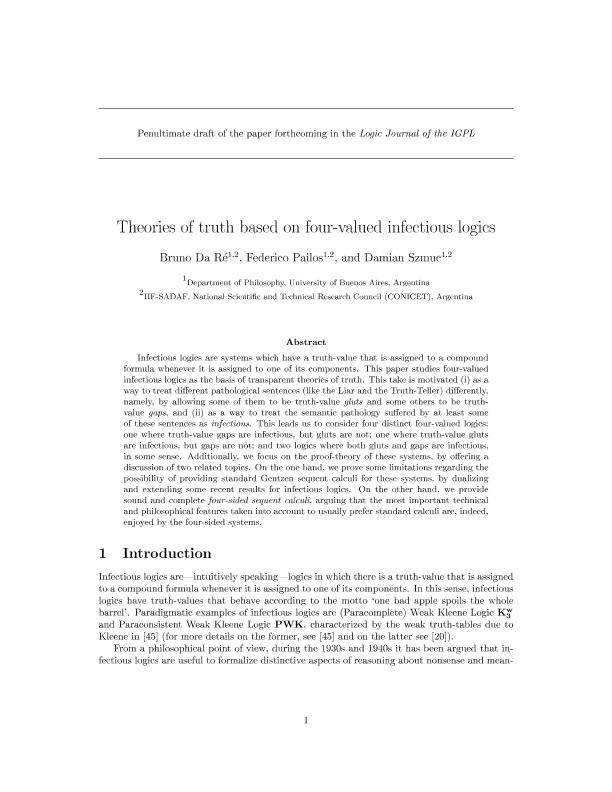Mostrar el registro sencillo del ítem
dc.contributor.author
Da Re, Bruno

dc.contributor.author
Pailos, Federico Matias

dc.contributor.author
Szmuc, Damián Enrique

dc.date.available
2020-02-27T20:31:22Z
dc.date.issued
2018-11
dc.identifier.citation
Da Re, Bruno; Pailos, Federico Matias; Szmuc, Damián Enrique; Theories of truth based on four-valued infectious logics; Oxford University Press; Logic Journal of the IGPL (print); 1; 11-2018; 1-32
dc.identifier.issn
1367-0751
dc.identifier.uri
http://hdl.handle.net/11336/98536
dc.description.abstract
Infectious logics are systems which have a truth-value that is assigned to a compound formula whenever it is assigned to one of its components. This paper studies four-valued infectious logics as the basis of transparent theories of truth. This take is motivated (i) as a way to treat different pathological sentences (like the Liar and the Truth-Teller) differently, namely, by allowing some of them to be truth-value gluts and some others to be truth-value gaps, and (ii) as a way to treat the semantic pathology suffered by at least some of these sentences as infectious. This leads us to consider four distinct four-valued logics: one where truth-value gaps are infectious, but gluts are not; one where truth-value gluts are infectious, but gaps are not; and two logics where both gluts and gaps are infectious, in some sense. Additionally, we focus on the proof-theory of these systems, by offering a discussion of two related topics. On the one hand, we prove some limitations regarding the possibility of providing standard Gentzen sequent calculi for these systems, by dualizing and extending some recent results for infectious logics. On the other hand, we provide sound and complete four-sided sequent calculi, arguing that the most important technical and philosophical features taken into account to usually prefer standard calculi are, indeed, enjoyed by the four-sided systems.
dc.format
application/pdf
dc.language.iso
eng
dc.publisher
Oxford University Press

dc.rights
info:eu-repo/semantics/openAccess
dc.rights.uri
https://creativecommons.org/licenses/by-nc-sa/2.5/ar/
dc.subject
INFECTIOUS LOGICS
dc.subject
MULTI-VALUED LOGICS
dc.subject
TRUTH
dc.subject
SEQUENT CALCULI
dc.subject.classification
Filosofía, Historia y Filosofía de la Ciencia y la Tecnología

dc.subject.classification
Filosofía, Ética y Religión

dc.subject.classification
HUMANIDADES

dc.title
Theories of truth based on four-valued infectious logics
dc.type
info:eu-repo/semantics/article
dc.type
info:ar-repo/semantics/artículo
dc.type
info:eu-repo/semantics/publishedVersion
dc.date.updated
2020-02-26T15:00:24Z
dc.journal.volume
1
dc.journal.pagination
1-32
dc.journal.pais
Reino Unido

dc.journal.ciudad
Oxford
dc.description.fil
Fil: Da Re, Bruno. Instituto de Investigaciones Filosóficas - Sadaf; Argentina. Universidad de Buenos Aires. Facultad de Filosofía y Letras. Departamento de Filosofía; Argentina. Consejo Nacional de Investigaciones Científicas y Técnicas; Argentina
dc.description.fil
Fil: Pailos, Federico Matias. Consejo Nacional de Investigaciones Científicas y Técnicas; Argentina. Instituto de Investigaciones Filosóficas - Sadaf; Argentina. Universidad de Buenos Aires. Facultad de Filosofía y Letras. Departamento de Filosofía; Argentina
dc.description.fil
Fil: Szmuc, Damián Enrique. Instituto de Investigaciones Filosóficas - Sadaf; Argentina. Consejo Nacional de Investigaciones Científicas y Técnicas; Argentina. Universidad de Buenos Aires. Facultad de Filosofía y Letras. Departamento de Filosofía; Argentina
dc.journal.title
Logic Journal of the IGPL (print)

dc.relation.alternativeid
info:eu-repo/semantics/altIdentifier/url/https://academic.oup.com/jigpal/advance-article-abstract/doi/10.1093/jigpal/jzy057/5219033
dc.relation.alternativeid
info:eu-repo/semantics/altIdentifier/doi/http://dx.doi.org/10.1093/jigpal/jzy057
Archivos asociados
